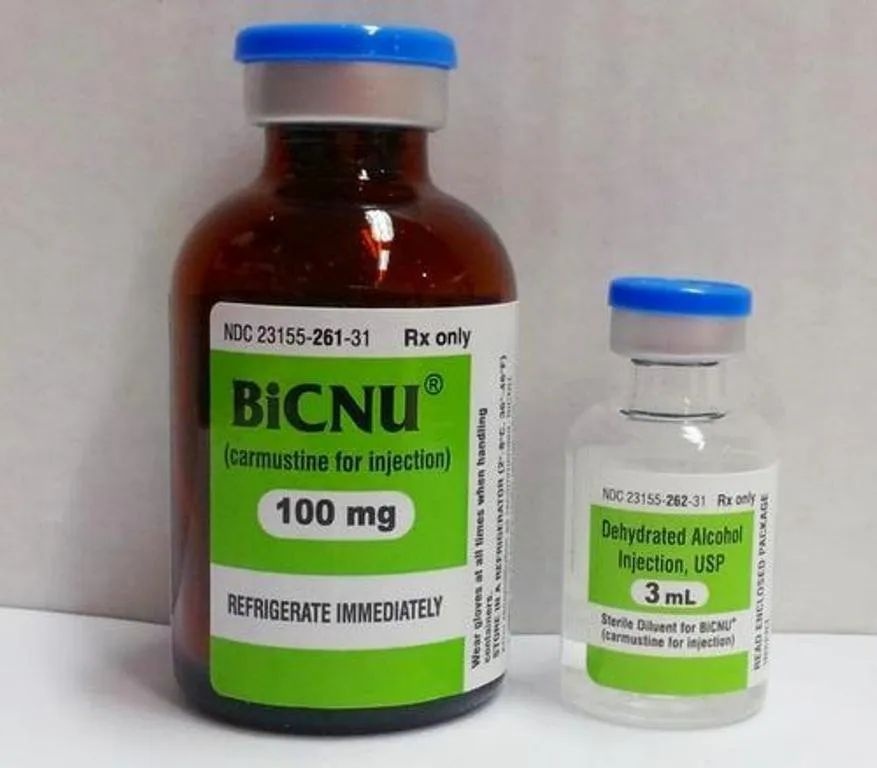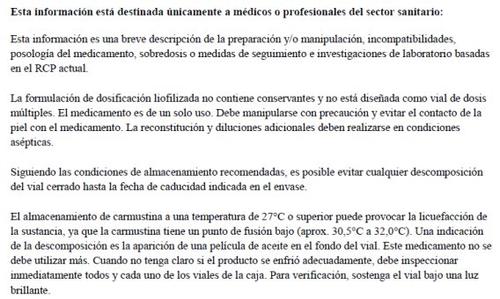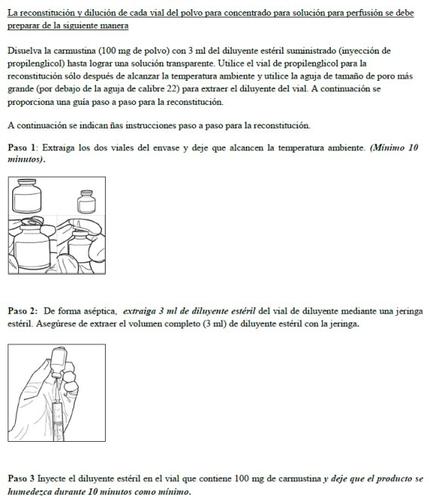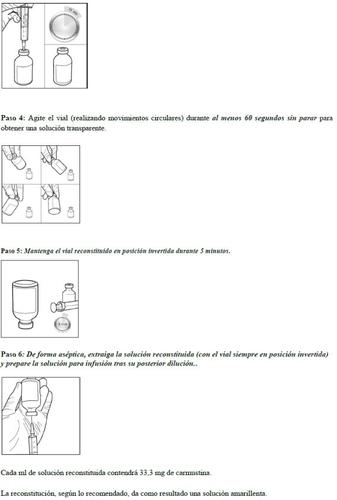
BICNU 100 mg POWDER AND SOLVENT FOR SOLUTION FOR INFUSION


How to use BICNU 100 mg POWDER AND SOLVENT FOR SOLUTION FOR INFUSION
Translated with AI
This page provides general information and does not replace a doctor’s consultation. Always consult a doctor before taking any medication. Seek urgent medical care if symptoms are severe.
Show originalContents of the leaflet
Introduction
Package Leaflet: Information for the User
BiCNU 100 mg Powder and Solvent for Solution for Infusion EFG
Carmustine
Read all of this leaflet carefully before you start using this medicine because it contains important information for you.
- Keep this leaflet, you may need to read it again.
- If you have any further questions, ask your doctor, pharmacist, or nurse.
- This medicine has been prescribed for you only. Do not pass it on to others. It may harm them, even if their signs of illness are the same as yours.
- If you get any side effects, talk to your doctor, pharmacist, or nurse. This includes any possible side effects not listed in this leaflet. See section 4.
Contents of the Package Leaflet:
- What is BiCNU and what is it used for
- What you need to know before you use BiCNU
- How to use BiCNU
- Possible side effects
- Storage of BiCNU
- Contents of the pack and other information
1. What is BiCNU and what is it used for
BiCNU is a medicine that contains carmustine. Carmustine belongs to a group of anticancer substances known as nitrosoureas, which slow down the growth of cancer cells.
BiCNU is used as palliative therapy (relieving and preventing patient suffering) as a single agent or in combination therapy with other approved anticancer substances for certain types of cancer, such as:
- Brain tumors - glioblastoma, medulloblastoma, astrocytoma, and metastatic brain tumors
- Multiple myeloma (malignant tumor developing from bone marrow)
- Hodgkin's disease (lymphoid tumor)
- Non-Hodgkin's lymphoma (lymphoid tumor)
Carmustine is also used as conditioning treatment prior to autologous stem cell transplantation (a procedure in which a person receives hematopoietic stem cells that produce any type of blood cell) in malignant hematological disorders of the lymphatic system such as Hodgkin's lymphoma and non-Hodgkin's lymphoma
2. What you need to know before you use BiCNU
Do not use BiCNU
- if you are allergic to carmustine, other nitrosoureas, or any other ingredient of this medicine (listed in section 6);
BiCNU must not be administered to patients who have a reduced number of platelets (thrombocytes), white blood cells (leukocytes), or red blood cells (erythrocytes), either as a result of chemotherapy or for other reasons;
if you have severe renal impairment;
in children and adolescents;
if you are pregnant or breastfeeding.
Warnings and precautions
Consult your doctor, pharmacist, or nurse before starting treatment with BiCNU.
Since the greatest toxicity of this medicine is delayed bone marrow suppression, your doctor will monitor your blood count at least for the 6 weeks following administration of the dose. At the recommended dose, BiCNU cycles will not be administered more frequently than every 6 weeks. The dose will be confirmed with the blood count.
Before treatment, both your liver and kidney function will be checked and will be regularly monitored during treatment.
Because the use of BiCNU can lead to lung damage, chest X-rays and lung function tests will be performed (please see the section "Possible side effects")
Treatment with high doses of carmustine (up to 600 mg/m2) is only performed in combination with subsequent stem cell transplantation. These high doses may increase the frequency or severity of pulmonary, renal, hepatic, cardiac, and gastrointestinal toxicities as well as infections and electrolyte imbalance (low blood levels of potassium, magnesium, and phosphate).
Abdominal pain (neutropenic enterocolitis) may occur as an adverse event related to chemotherapy.
Patients who have multiple conditions simultaneously and have a more precarious state of illness have a higher risk of suffering side effects. This is especially important for elderly patients.
Your doctor will advise you on the possibility of lung damage that may appear due to the use of BiCNU and on allergic reactions and their symptoms. If such symptoms appear, you should consult your doctor (see section 4)
Using BiCNU with other medicines
Tell your doctor or pharmacist if you are taking, have recently taken, or might take other medicines, including medicines without a prescription, such as:
- Phenytoin, used for epilepsy
- Cimetidine, used for stomach problems such as indigestion
- Digoxin, used if you have an abnormal heart rhythm
- Melphalan, an anticancer drug
Pregnancy, breastfeeding, and fertility
If you are pregnant or breastfeeding, think you may be pregnant, or are planning to have a baby, ask your doctor or pharmacist for advice before using this medicine.
Pregnancy and fertility
BiCNU should not be used during pregnancy as it may harm the fetus. Therefore, BiCNU should not be administered normally in pregnant women. If it is administered during pregnancy, the patient must be informed about the potential risk to the fetus. Women of childbearing age are advised to avoid becoming pregnant.
Male patients must use adequate contraceptive measures during treatment with BiCNU for at least 6 months.
Breastfeeding
You should not breastfeed while taking this medicine.
Driving and using machines
The effect of this medicine on driving and using machines is not known. You should consult your doctor before driving or using any tool or machine because the amount of alcohol in this medicine may reduce your ability to drive or use machines.
BiCNU contains propylene glycol
The propylene glycol in this medicine may have the same effects as alcohol consumption and increase the likelihood of side effects.
Do not use this medicine in children under 5 years of age.
Use this medicine only if it is recommended by a doctor. Your doctor may perform additional checks while you are taking this medicine
3. How to use BiCNU
BiCNU will always be administered by healthcare professionals with experience in the use of anticancer agents.
This medicine is administered intravenously.
Adults
The dose depends on your medical condition, body size, and response to treatment. It is usually administered at least every 6 weeks. The recommended dose of BiCNU as a single agent in patients who have not been previously treated is 150 to 200 mg/m2 intravenously every 6 weeks. This can be administered as a single dose or divided into two daily injections of 75 to 100 mg/m2 over two consecutive days. The dose will also depend on whether BiCNU is administered with other anticancer drugs.
The doses will be adjusted depending on how you respond to treatment.
The recommended dose of carmustine administered in combination with other chemotherapeutic agents before stem cell transplantation is 300-600 mg/m2 intravenously.
Your blood count will be monitored frequently to avoid bone marrow toxicity and adjust the dose if necessary.
Method of administration
Intravenous administration must be carried out by perfusion.
BiCNU is administered into a vein through a drip over a period of one to two hours. The perfusion time should not be less than one hour to avoid burns and pain at the injection site. The injection site will be monitored during administration.
The duration of treatment will be determined by your doctor and may vary for each patient.
Use in elderly patients
BiCNU can be used with caution in elderly patients. Kidney function will be carefully monitored.
In elderly patients, the incidence of inflammation of the mucous membranes of the mouth (oral mucositis) is higher when a high dose of carmustine is administered
If you use more BiCNU than you should
Since it will be your doctor or nurse who administers this medicine, it is unlikely that you will receive an incorrect dose. Inform your doctor or nurse if you have any doubts about the amount of medicine you are receiving.
If you have any further questions on the use of this product, ask your doctor, pharmacist, or nurse.
In case of overdose or accidental ingestion, consult your doctor or pharmacist immediately or call the Toxicological Poisoning Service. Telephone 91 562 04 20, indicating the medicine and the amount ingested.
4. Possible side effects
Like all medicines, this medicine can cause side effects, although not everybody gets them.
Tell your doctor or nurse immediately if you experience any of the following symptoms:
Any sudden wheezing, difficulty breathing, swelling of the eyelids, face, or lips, rash, or itching (especially if it affects the whole body), and a feeling of fainting. These can be signs of a severe allergic reaction.
BiCNU can cause the following side effects:
Very common(may affect more than 1 in 10 people)
- Delayed bone marrow suppression (decrease in blood cells in the bone marrow);
- Ataxia (lack of voluntary muscle coordination);
- Dizziness;
- Headache
- Transient eye redness, blurred vision, retinal bleeding;
- Hypotension (low blood pressure) in high-dose therapies;
- Phlebitis (inflammation of the veins);
- Respiratory disorders (lung disorders) with breathing problems;
- Severe nausea and vomiting; starting 2-4 hours after administration and lasting up to 4-6 hours;
- When used on the skin, skin inflammation (dermatitis)
- A accidental contact with the skin can cause transient hyperpigmentation (darkening of a skin area or nails)
Common(may affect up to 1 in 10 people)
- Acute leukemia and bone marrow dysplasias (abnormal development of the bone marrow) after long-term use; The following symptoms may appear: gum bleeding, bone pain, fever, frequent infections, frequent or severe nosebleeds, lumps due to inflammation of the lymph nodes in and around the neck, armpit, abdomen, or groin, pale skin, difficulty breathing, weakness, fatigue, or general lack of energy;
- Anemia (decrease in the number of red blood cells in the blood);
- Encephalopathy (brain disorder) in high-dose therapies;
- Lack of appetite (anorexia);
- Constipation;
- Diarrhea;
- Inflammation of the mouth and lips;
- Reversible liver toxicity in high-dose therapies, up to 60 days after administration. This may be manifested by an increase in liver enzymes and bilirubin.
- Alopecia (hair loss);
- Redness of the skin;
- Reactions at the injection site
Uncommon(may affect up to 1 in 100 people)
- Veno-occlusive disease (progressive blockage of small veins in the liver) in high-dose therapies; in which small veins in the liver are blocked. The following symptoms are possible: fluid accumulation in the abdomen, spleen enlargement, severe bleeding from the esophagus, yellowish skin color, and white skin around the eyes;
- Respiratory problems due to a type of lung disease in which the tissue is scarred by interstitial fibrosis (at lower doses);
- Kidney toxicity;
- Gynecomastia (breast growth in men);
- Inflammation of the optic nerve and adjacent retina in the eye;
- Bleeding from the intestinal tract
Rare(may affect up to 1 in 1,000 people)
- Inflammation of the venous wall with associated thrombosis (thrombophlebitis)
Frequency not known(frequency cannot be estimated from the available data)
- Allergic reactions
- Muscle pain;
- Secondary tumors (cancers caused by radiation or chemotherapy);
- Seizures (attacks) including "status epilepticus";
- Tissue damage due to leakage at the injection site;
- Infertility;
- Impaired embryonic/fetal development in pregnant women;
- Any sign of infection;
- Fast heartbeat, chest pain.
- Electrolyte imbalance (low blood levels of potassium, magnesium, phosphate);
- Abdominal pain (neutropenic enterocolitis)
Reporting of side effects
If you experience any side effects, talk to your doctor, pharmacist, or nurse. This includes any possible side effects not listed in this leaflet. You can also report side effects directly through the Spanish Medicines and Healthcare Products Agency (AEMPS) website: www.notificaRAM.es
By reporting side effects, you can help provide more information on the safety of this medicine.
5. Storage of BiCNU
Keep this medicine out of the sight and reach of children.
Do not use this medicine after the expiry date which is stated on the label and on the carton after "EXP.". The expiry date refers to the last day of that month.
This medicine will be stored by your doctor or healthcare professional.
The unopened vial of the powder should be stored in a refrigerator (2°C-8°C).
After reconstitution according to the recommendations, the carmustine injectable solution is stable for 480 hours in refrigeration (2°C-8°C) and 24 hours at room temperature (25°C ±2°C) in a glass container. Examine the reconstituted vials for crystal formation before use. If crystals are observed, they can be redissolved by warming the vial to room temperature with agitation.
The reconstituted solution diluted to 500 ml with sodium chloride 0.9% for injection or with Dextrose 5% for injection, in glass or polypropylene containers, results in a solution that must be used within 4 hours at 25°C ± 2°C and must be protected from light. These solutions are also stable for up to 48 hours in a refrigerator (2°C-8°C) protected from light.
A sign of decomposition is the appearance of an oil film at the bottom of the vial. If this occurs, this medicine should not be used anymore. When you are not sure whether the product has been cooled properly, then you should immediately inspect all the vials in the box. For verification, hold the vial in bright light. Carmustine appears with small amounts of dry scales or a rigid dry mass.
Medicines should not be disposed of via wastewater or household waste. Ask your pharmacist how to dispose of medicines no longer required. This will help protect the environment.
6. Contents of the pack and other information
Contents of BiCNU
The active substance is carmustine.
A 30 ml vial contains 100 mg of carmustine and a 5 ml vial contains 3 ml of sterile solvent (propylene glycol).
Other ingredients
Powder: No excipients
Solvent: propylene glycol
Appearance and packaging
Powder and solvent for solution for infusion
Yellowish powder for reconstitution.
Appearance of the solution: colorless to light yellow.
Powder: Type I amber glass vial (30 ml) sealed with a dark gray bromobutyl rubber stopper and an aluminum seal with a polypropylene cap.
Solvent: Type I glass vial (5 ml) sealed with a gray bromobutyl rubber stopper and an aluminum seal with a polypropylene cap.
Marketing authorization holder
Laboratorios Tillomed Spain, S.L.U.
C/ Cardenal Marcelo Spínola 8, 1st floor - door F
28016 Madrid
Spain
Manufacturer
SGS Pharma Magyarorszag Kft.
Derkovits Gyula Utca 53,
Budapest XIX, 1193,
Hungary
Tillomed Malta Limited,
Malta Life Sciences Park,
LS2.01.06 Industrial Estate,
San Gwann, SGN 3000, Malta
[1] In the marketed product, only the center that actually performs the release will be indicated.
You can obtain further information on this medicine from the local representative of the marketing authorization holder:
Zentiva Spain S.L.
Avenida de Europa, 19, Building 3, 1st floor.
28224 Pozuelo de Alarcón, Madrid
Spain
This medicine is authorized in the Member States of the European Economic Area under the following names:
Spain: BiCNU 100 mg Powder and Solvent for Solution for Infusion EFG
Date of last revision of this leaflet: November 2024.
Detailed and updated information on this medicine is available on the website of the Spanish Agency for Medicines and Healthcare Products (AEMPS) http://www.aemps.gob.es/




- Country of registration
- Availability in pharmacies
Supply issue reported
Data from the Spanish Agency of Medicines (AEMPS) indicates a supply issue affecting this medicine.<br><br>Availability may be limited in some pharmacies.<br><br>For updates or alternatives, consult your pharmacist. - Active substance
- Prescription requiredYes
- Manufacturer
- This information is for reference only and does not constitute medical advice. Always consult a doctor before taking any medication. Oladoctor is not responsible for medical decisions based on this content.
- Alternatives to BICNU 100 mg POWDER AND SOLVENT FOR SOLUTION FOR INFUSIONDosage form: INJECTABLE PERFUSION, 100 mgActive substance: carmustineManufacturer: Accord Healthcare S.L.U.Prescription requiredDosage form: INJECTABLE PERFUSION, 300 mgActive substance: carmustineManufacturer: Accord Healthcare S.L.U.Prescription requiredDosage form: INJECTABLE PERFUSION, 50 mgActive substance: carmustineManufacturer: Accord Healthcare S.L.U.Prescription required
Online doctors for BICNU 100 mg POWDER AND SOLVENT FOR SOLUTION FOR INFUSION
Discuss questions about BICNU 100 mg POWDER AND SOLVENT FOR SOLUTION FOR INFUSION, including use, safety considerations and prescription review, subject to medical assessment and local regulations.
Frequently Asked Questions






